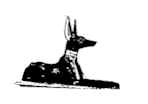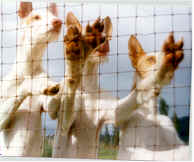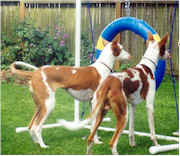Would you like to make this site your homepage? It's fast and easy...
Yes, Please make this my home page!
 |
Find a Good Breeder:
Here's What You Need to Know
|
The Ibizan Hound is an unusual breed of dog in the United
States, and breedings are not numerous. Initial contact of a breeder may be made through
Breeder Referral at The Ibizan Hound Club of the United States, or by observing Ibizan
Hounds at local dog shows, lure coursing, or other canine events and getting in touch with
the breeders of the dogs you see. Do not assume that you are dealing with a
reputable breeder! IHCUS does not insure a standard of quality or honest conduct.
You are the only one who can determine if you are dealing with a trustworthy breeder.
A Word About IHCUS
National breed clubs are voluntary
organizations. While The Ibizan Hound Club of the United States has a Code of Ethics (required by the AKC), there is no assurance that breeders on the breeder
referral list meet this code of ethics. When you contact
Breeder Referral at IHCUS and receive a list of breeder names, be aware that you are on
your own. The breeder may or may not sell you a dog or
puppy that is healthy and socialized.
With this information in mind, it is worth
checking out the IHCUS
website.
Checking Out That Breeder
Beware of a kennel offering more than a few puppies from a
current litter, or more than one or two adult dogs for sale. A kennel which always
has eight or nine dogs for sale is an indication of a business out of control:
poor socialization, poor follow-up care, and other hidden problems may show up after the
contract is signed.
As the potential purchaser, you can and should be in control
of the initial process of interview and evaluation. Many people, anxious to own that
puppy, ignore warning signs that they are getting less than the dog of their dreams
because they are so eager to be an acceptable buyer to the breeder. Decide that this is
going to be the best dog available to you. You are investing a
considerable amount of money in getting the best lines, the best health, the best early
socialization and training, and the best expert advice and assistance that will be
available to you for the life of the dog.
Do not purchase from a breeder or a pet
store with the thought that you are rescuing the dog (or the breeder).
True rescues are available through genuine rescue organizations such as the Podenco Aid
Foundation, and payment only covers shipping, medical care, and perhaps a donation to the
nonprofit corporation. Purchasing from a breeder or pet store perpetuates more breeding.
By "saving" one puppy you are insuring that more puppies will have to endure
what the first little one did.
Does the Breeder Meet Your
Standards?
|
 |
It is well worth the time and trouble to visit the breeder's
kennel. If you are purchasing from a distant breeder, then be sure to interview others who
have purchased dogs from the same breeder, and ask them about the kennel conditions:
- The breeder should be able to provide references of satisfied
buyers. Be sure to follow up on them, and question the references about any difficulties
or second thoughts they may have had. Ask about the quality of follow-up care.
- The breeder should be able to explain the Breed Standard, and
how his or her lines meet or deviate from them. The responsible breeder should be willing
to educate the potential buyer about show vs. pet quality, and alert the buyer to faults
in his or her line. The responsible breeder engages the dogs in sports appropriate to the
breed: coursing, agility, obedience, tracking or hunting. Learn about the Titles
obtainable in each sport, and inquire about the breeder's dogs' achievements.
- Kennels should be clean, with fresh drinking water in clean
containers. There should be indoor as well as outdoor facilities, comfortable beds, toys,
and fresh chew items. Dirt runs are not ideal, as the soil may be infested with parasites,
but if present should have a layer of chips or sawdust. Note the presence of flies and
what is being done to control them. Fleas should not be present.
- Dogs should be of good weight, clean, energetic, not
aggressive or excessively timid. Look for condition of teeth, ears, eyes, and nails. Be
alert for redness or discharge from the eyes.
- Definitely ask to see and meet the older dogs on the
property. Brood bitches past the age of safe whelping and older stud dogs should
be either in pet homes where they are valued, or present as house pets. It is especially
informative to take a look at these older dogs. Subtle clues such as condition of teeth,
nails, and skin tell volumes about the commitment the breeder has made to the well-being
of his or her dogs and your prospective puppy.
- Find out how many litters are whelped each year. The demand
for Ibizan Hounds is not high, so the responsible breeder is never breeding more than 2
litters in a year, if even that much. Get a sense of whether the breeder regards breeding
as an income source. Profiting from breeding indicates that he or she is not breeding to
help or improve the breed, and you would be wise to quit the interview right there.
- Ask to see the dam and sire (if he is on the property). Look
for general health, vigor, and temperament. Ask about the achievements of the sire and dam
in canine sports.
- Ask to see a history of the breeder's lines. See how many
times the dogs and bitches were used in breeding. A bitch should not be bred at less than
2 years nor older than 8, nor should she produce more than 3 litters in her lifetime. She
should not be bred more than 2 out of 3 consecutive seasons.
- Responsible breeders should test for at least two of the
following hereditary conditions: hips (OFA, not Penn), eyes (CERF), Axonal Dystrophy rate,
thyroid (complete panel), and hearing (BAER testing). Because there is no organized data
collection for hereditary defects in Ibizan Hounds, breeders will disagree on which tests
are necessary, but there should be evidence that the breeder is consistently checking for
hereditary problems. Ask to see the test results on both the sire and the dam. If
these test results are not available to you, it is time to look elsewhere for your puppy.
- If the litter is already present, note where it is kept, and
what is being done to socialize it. Puppies should be house dogs until they are sent to
their new homes. A puppy kept in a kennel or barn will not have had the appropriate social
stimulation and interaction with people to be an optimal pet. At the appropriate
developmental stages they should have been introduced to children and other people, other
animals such as cats, washing machines, vacuum cleaners and lawn mowers, and riding in the
car. Littermates should appear healthy and vigorous.
- See the contract/guarantee before leaving a deposit
or purchasing a puppy. Read the contract thoroughly. Sad to say, the disreputable
breeder can (and will) try to insert clauses to which you never agreed. The contract
should specify details of the sale, including a health guarantee and the
breeder's lifetime commitment. The kind of health guarantee will change from
breeder to breeder, but it should be in the written contract in some form. The breeder
should be able and willing to take the puppy or dog back at any point in its life if you
are unable to keep it. Do not accept verbal assurances in place of a
written contract on these points. Puppies should be a minimum of 8 weeks old, with
appropriate vaccinations and worming, and fulfillment of the contract should be
conditional upon the examination of the puppy by your veterinarian within a specified time
period. If the puppy is pet rather than show quality, spaying or neutering should be a
part of the contract. AKC registration should be clearly specified. Read the
contract thoroughly.
- Ask about the history of returns. Nearly all reputable
breeders, sooner or later, must deal with this inevitable heartache. Does the returned dog
rehome successfully, remain a house pet, or is he euthanized? Does the breeder complain
about expenses incurred? Look for warning signs that the breeder is breeding for profit,
rather than caring for the lives brought into the world.
- The responsible breeder will provide a packet of information
regarding training, diet, and general care, with several resources for you to check out.
Ask to see this before signing the contract.
- Here is the most important question of all
to ask yourself: Do I like this person? Is this breeder someone I want in my life
for the lifetime of my dog? Because that is exactly what is going to happen. Rely
on your instincts about this person, and follow them.
- Be prepared to be inspected as closely as you just inspected
the breeder. The more questions asked, and the more references required, often indicate
the degree of dedication of the breeder to his or her dogs, and how much follow-up
assistance you can expect.
It may take time, patience, and quite a few long-distance
phone calls until you feel you have the right breeder lined up, but it is worth every
moment and every penny to get that special dog. The results will be worth it.
 |
See more about the author of this Web site and
her dogs, e-mail a comment on this site. |

